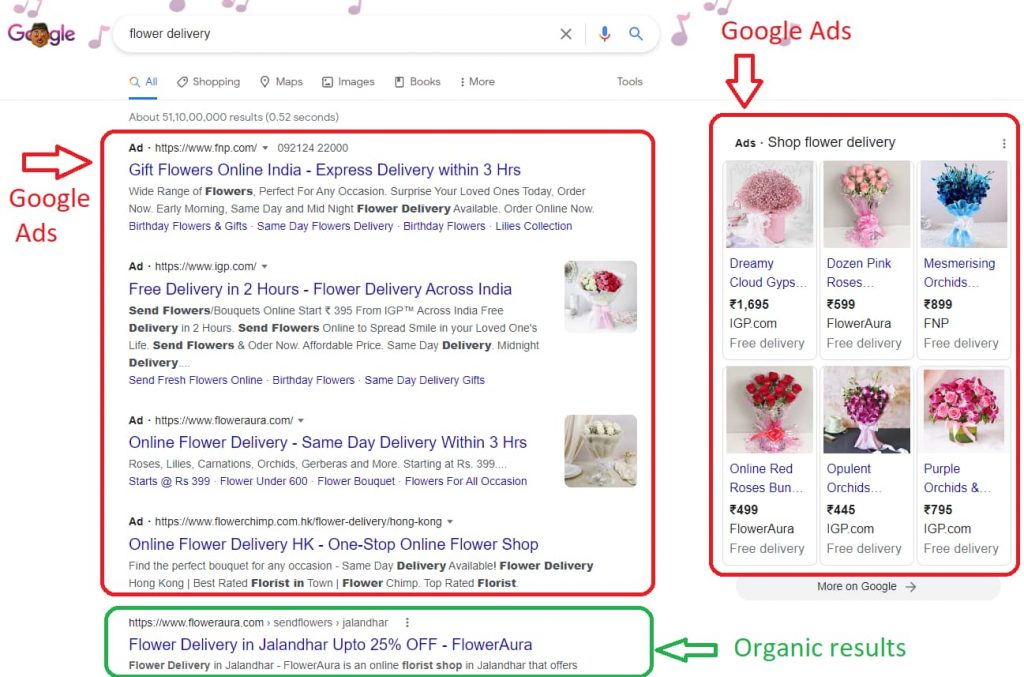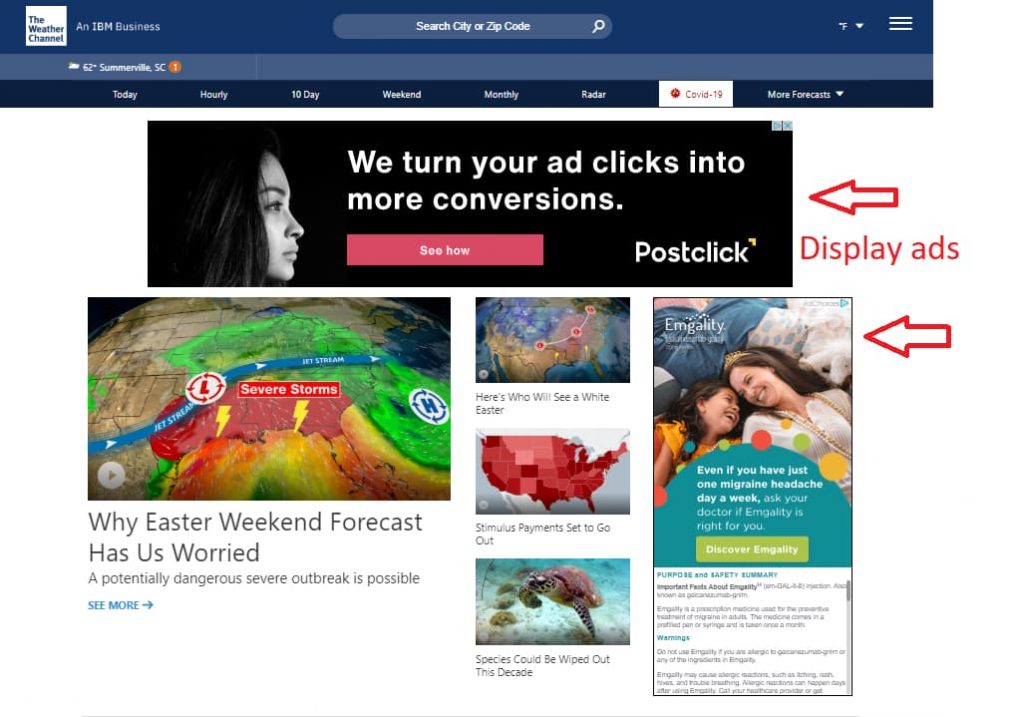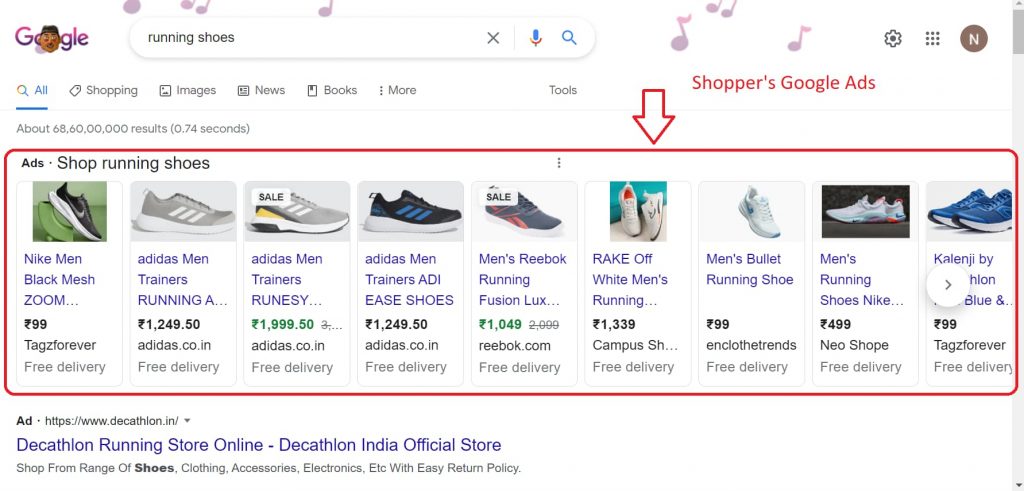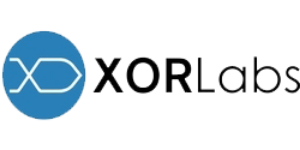Anyone using Google is probably familiar with Pay-Per-Click (PPC) ads. PPC advertising is when the advertisers must pay a set amount of fees each time one of their ads is clicked. Hence the name “pay per click”. Pay as and when an ad is clicked on.
You can see PayPerClick ads right above the organic search results on search engine result pages (SERPs). A PPC display ad or a PPC ad on social media platforms may have also caught your attention.
The majority of businesses adopt PPC, a kind of paid advertising and digital marketing, to expand their reach and boost website traffic. They’re a wonderful approach to generating new leads and sales with the right plan.
Only if the advertisement is clicked is the fee paid. In essence, this strategy is purchasing website traffic. Google Ads, Facebook Ads, and Twitter Ads are a few of the platforms that provide a Pay per Click option for advertising.
The PPC advertising model is a key concept to master in digital marketing. So let’s start now!
Table of Content:
- What is PPC
- What is a PPC ad auction?
- What are keywords for PPC?
- What are the benefits of PPC?
- How does PPC work?
- What are the different types of PPC ads?
- How to launch a PPC ad campaign?
- Conclusion: Get started with pay-per-click advertising
What is PPC?
The phrase “pay-per-click advertising” describes a form of advertising in which you are charged each time a user clicks on your ads. PPC is often called pay-per-click or pay-per-advertising. You may easily bring your brand name in front of users in prominent online locations by using PPC adverts. By using the right strategy you can generate new leads and sales in an effective way.
PPC is a digital marketing strategy that enables you to display your advertisements on search engine results pages (SERPs), social media platforms, and other websites. PPC involves paying each time a user clicks on your ad. Various factors determine the amount you pay for ad space, including your bid in the PPC ad auction.
In the pay-per-click (PPC) model of digital advertising, an advertiser is charged a fixed or auction-based fee each time a visitor clicks on one of their adverts and lands on their website. A pay-per-click campaign’s goal is to “purchase visitors” for a certain website. The goal is to encourage a particular kind of user activity, like signing up or making a purchase.
Learn more about pay-per-click marketing and how it works by reading on. Get a step-by-step guide for starting your first PPC marketing campaign. Get in touch with us online to learn more about our PPC packages if you need to improve your ads.
What is a PPC ad auction?
Advertising platforms use auctions to choose which ads to display. Depending on the advertising platform and ad type, this auction considers the amount each ad bids, the quality of each ad, and the relevancy of the ads to the use of other factors.
Real-time bidding (RTB), which is used by advertising platforms like Google Ads and Bing Ads, allows advertising inventory to be auctioned in a private automated auction utilizing real-time data.
Instantaneously, an auction for the keyword occurs whenever there is ad space on a SERP.
The PPC engine runs on these auctions. They start when someone uses a search engine to look for something.
Based on the keywords that advertisers bid on, an auction is initiated if there are multiple advertisers interested in showing ads linked to a user’s search query.
The winning advertisements then show up on the search engine results page.
What are keywords for PPC?
In PPC, keywords are the pillar of everything. You determine where your advertising should appear using keywords.
You won’t succeed with PPC unless you have a thorough understanding of what keywords are and how to use them successfully.
Pay-per-click advertising involves bidding on keywords or phrases that users enter into search engines. To advertise a business, product, or service, advertisers select keywords that prospective buyers will use to find out more information.
Advertisers are able to match search queries with varying degrees of precision based on the keyword match types they apply.
Advertisers can decide whether to need a precise match between keywords and search queries or to allow for variances like altered word placement, alternative spellings, or the presence of additional words.
Negative keywords can also be used to avoid irrelevant traffic by preventing ads from being triggered by search queries containing those terms.
What are the benefits of PPC?
PPC offers many benefits to your business, including:
- Greater Exposure
A pay-per-click advertisement can increase conversions, brand recognition, and website traffic for your company. With so many possibilities for placement, you may choose which audiences see your PPC advertising and how to target your most valued potential clients.
More exposure and brand recognition as a result of the directed traffic to your website.
2. Optimized PPC is economical
A PPC campaign allows you to choose the maximum amount you’d like to pay for your ads, which makes it a highly effective digital marketing strategy.
Doesn’t it sound too good to be true? Wrong!
You’ll pay a specific budget for traditional marketing techniques like running an advertisement in the newspaper or putting up a banner for your company, but how many potential buyers will actually see that advertisement?
You will pay the same price for that newspaper ad or billboard, whether 5 or 500 potential clients see it.
PPC advertising differs in that you only have to pay when a user clicks your ad. That is correct!
PPC advertisements charge you for the activity, not the ad space. Given the fact that you never pay for an advertisement until there is a chance of a conversion, you can be certain that the ROI of a PPC campaign is high.
It leads to higher click-through rates (CTR), more conversions, and better sales revenue.
3. Offers immediate traffic
With a little tweaking, you may get up and running quickly even if you’re a decade behind your competition in PPC marketing.
This stands in stark contrast to the first stages of SEO campaigns, which can require a lot of time and work to achieve the same positioning and traffic that Google Ads gives within minutes of launch.
With PPC, you may immediately cast a wide net to attract fresh leads and clients.
With the exception of help with setting up conversion tracking and any necessary landing pages, you can get up and running quickly with little input from your development teams.
4. PPC Can Be Measured & Tracked
The fact that PPC advertising through Google Ads is simple to assess and track is a huge advantage. Leverage Google Analytics along with the Google Ads tool.
Based on the established business goals, you’ll receive high-level performance information, such as impressions, clicks, and conversions.
The success of your PPC campaign is not a mystery.
Statistics are easily accessible and demonstrate how your campaigns are doing in terms of traffic and returns for your money.
5. PPC Complements Other Marketing Channels Well
The Google Ads engine can speed up visitor traffic to your content and increase the return on your content investment.
PPC and SEO complement each other effectively since they frequently target the same audience—users of Google to locate information, products, or services—and offer similar impressions and traffic prospects.
On a keyword-by-keyword level, the performance data of impressions, clicks, and conversions from Google Ads can offer significant insight and guidance for prioritizing SEO efforts.
On the other hand, if the data is accessible, SEO strategy and organic traffic performance statistics can also offer PPC advice.
6. Excellent targeting options
You won’t waste a single click because of the multiple segmentation options. Only the users you specify will see the advertisement. This produces better results because there is a larger likelihood that a user who is in the target market will click the advertisement. The cost of the advertisement decreases as the click-through rate increases.
You can make sure the full potential of Google Ads is utilized and that you’re obtaining the most impressions while remaining targeted to the demographics of your potential audience by testing and trying out a wide range.
You have a lot of alternatives when deciding how wide a net to cast.
How does PPC work?
PPC advertising is a keyword-based marketing strategy. Different search keywords and phrases are given values by PPC campaign management platforms like Adwords based on their search volume, difficulty, and level of competition. The price of a keyword increases as more marketers compete for it.
Limited Google pay-per-click advertising spots are available on marketing channels including the Google homepage. As a result, you must compete to get your PPC place. To make their Google PPC advertising appear more prominent, advertisers cannot just pay more.
Google PPC ads and other PPC adverts are up for auction. This has to do with an automated procedure that search engines employ to evaluate the validity and relevance of adverts that show up on their SERPs. To improve your ad rank and reduce your cost per click (CPC), you must make sure your Google pay-per-click advertisements have a high-Quality Score.
Your pay-per-click campaigns must be suitable to the demographics of your target audience, contain useful keywords, have high click-through rates (CTRs), and direct prospects to a landing page with SEO optimization if you want to achieve a high-Quality Score.
The user is taken to a landing page when they click on your advertisement. A form for customers to take action—either to buy the product or learn more about it—is typically present on a landing page. Whatever the next step in the shopping process may be, your landing page encourages customers to take it.
Pay-per-click alternatives are available with the major social media advertising tools, such as Facebook Ads and Instagram Ads.
These commercials are a natural part of the user’s social network experience and can be found in the news feed or a side column. One of their key benefits is that it enables you to create highly segmented PPC advertising by utilizing the user data that social networks have available (for example, “married women who have recently moved to X”).
What are the different types of PPC ads?
Understanding the various PPC marketing campaigns that can help you establish your online presence and market your products to the appropriate demographic is the next step after learning what paid marketing is. The right PPC ads that you can employ to complete your sales funnel are determined in close collaboration with your team by our pay-per-click advertising agency.
Depending on your objectives, different pay-per-click ad formats are available:
- Google Ads
The most popular type of PPC advertising is search ads. Prospects who are already searching online for your sector or brand offers see your search ads.

These pay-per-click advertisements are appropriate for one-time campaign promotions or short sales cycles. Businesses looking to generate solid, high-quality leads from brand-new clients are advised to use search ads.
2. Display Ads
Over 90% of web visitors are known to be effectively reached by display advertising. Targeting users who visited websites with a similar industry, display advertising is displayed on Google’s partner websites.

Display advertising makes the most of photos and text to grab online consumers’ attention and persuade them to engage. Display advertisements are advised for businesses with lengthy sales cycles and niche or upscale clientele.
3. Facebook ads
The fastest-growing subset of pay-per-click advertising services is social media paid ads. Social networking sites like Facebook, LinkedIn, and Twitter feature social ads. They have been trained to connect with prospects based on, among other things, their networks, interests, and hobbies. Social media advertising is appropriate for firms with a robust social media following and a niche audience.
4. Shopper’s Google Ads
Google Shopping advertisements are appropriate for websites with a lot of products.

Customers can examine the products and pricing on Google SERP before they ever click on any website thanks to these PPC advertisements, which appear in a carousel above or next to the primary Google search results.
This means that, provided your target clients have already looked at all of the available products on Google Shopping ads, every click you spend has a better probability of converting. For eCommerce companies looking to connect with clients who have a clear intention to buy, our PPC agency suggests Google Shopping.
5. Ads on Amazon
One of the PPC services that are becoming more and more popular in the internet environment is Amazon advertising.

By placing sponsored advertising on the platform’s strategic spots, Amazon PPC ads enable Amazon sellers to increase store traffic, increase sales, and build brand recognition. At XOR Labs, we coordinate your Amazon PPC campaigns and raise your profit margin by utilizing the technical know-how and expertise of our PPC experts.
How to launch a PPC ad campaign?
You should adhere to a tried-and-true approach if you want to achieve PPC success. If you don’t know what you’re doing, it’s simple to blow money on PPC advertising that doesn’t work. Here is the method we adopt:
- Set objectives and goal metrics.
As long as you decide how you will measure those goals, your campaign goals will let you measure the value of your marketing spend.
Let’s discuss a few typical PPC objectives and how to measure them.
Lead generation: Having a suitable and interesting landing page to go along with your sponsored advertisement will directly result in lead creation. Since each ad group will have its own landing page, it should be simple to track lead conversions there or use a tracking pixel in the Google Ads interface.
Sales: How much of your goods or services are sold as a result of your online ads can be used to measure sales. Through CMS software, you should be able to keep track of this.
Site Traffic: If your website has great content, increasing site traffic is a terrific goal to have. You should have some degree of trust that you can keep visitors on your site and eventually convert them into leads if you’re going to spend money paying people to visit your website.
Brand Awareness: Brand awareness measures how well-known your business is to your target market. Surveys, direct visitors, and social engagement are all effective ways to gauge brand awareness.
Offer Promotion: If you’re having a limited-time promotion, a product or service discount, or a competition, offer promotion is fantastic. You can identify the users who clicked on your advertisement through a special sign-up page or a special discount code.
2. Create a consumer persona.
You must understand your target audience before you can promote them successfully. You must be aware of your audience’s demographics, problems want, and purchasing patterns as well as the search phrases they are probably using.
It’s time to establish a consumer persona if you don’t already have one. This is merely a description of your ideal client.
You can consider how once you are clear on who you are aiming for.
3. Keyword Research
Developing a winning PPC campaign involves a lot of research and selection of keywords, as well as organizing those keywords into well-organized campaigns and ad groups.
Brainstorming possible keywords: Search engines use the collection of keywords you assign to each ad group you create to determine when and where to display your advertisement. The usual rule of thumb is to choose one to five keywords per ad group, and those keywords need to be very relevant to improve your Quality Score.
Competitor keyword research: You can use some of your competitors’ keywords in your campaign if you know what they’re ranking for. Some platforms, like SEMrush, even allow you to see how your rivals are using PPC.
Include negative keywords: Consider anything you’re purposefully choosing not to target as you choose which keywords to target in your PPC campaign. We refer to these as negative keywords. Typically, these are synonyms for your target keywords that are being used by users who are looking for completely other things.
Create a final keyword list based on your spending limit: A PPC campaign cannot be run with a limitless budget, therefore you must eliminate any keywords that are too expensive or not worthwhile. To prevent overspending, set a maximum CPC for each supplied keyword.
4. Write an outstanding Ad copy
The copy is crucial in advertising. If your writing is subpar, it won’t matter if you’ve developed a customer persona or flawlessly honed your keyword list.
As you write your copy, go back to your customer persona. What would be attractive to that person? What kind of words and tone are you using with them?
In the description, mention your unique selling proposition. Why should the consumer choose your product over that of your main competitors? Why should people choose your link over any of the other results, exactly?
To make it clear to potential clients what you want them to do, use a strong CTA.
5. Track, edit, and Improve
There is no reason not to install Google Analytics on your website since it is free to use. The application gives you information about how well your website is doing, how visitors engage with your pages, and what kind of content draws them in. Google Analytics data can be utilized for PPC and other purposes.
Ensure that you are keeping track of important data like click-through rates, conversion rates, and overall profit margin.
Don’t be hesitant to explore new things and experiment. Try a different wording, a different CTA, or more ad extensions if your advertisement isn’t getting the desired results. Run A/B tests to see what is effective. A minor adjustment can have a significant impact.
Conclusion: Get started with pay-per-click advertising
Don’t have enough time to conduct a PPC analysis and start your PPC campaign? Trust our pay-per-click Agency with your PPC services, and we’ll handle the technical stuff.
We Assist You in Increasing Your Quality Score and Online Revenue.
At XOR Labs Performance Agency, we build your pay-per-click campaign structure, choose your PPC campaign metrics, and decide on your PPC search engine marketing (SEM) goals in order to increase website traffic and lower PPC management costs.
Your SEO and online marketing initiatives will benefit greatly from the seamless integration of PPC with our pay-per-click services. Join forces with our pay-per-click marketing agency and take advantage of our low-cost PPC advertising solutions.
